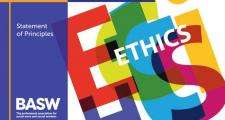1. PROFESSIONALISM
Identify and behave as a professional social worker, committed to professional development
Social workers are members of an internationally recognised profession. Our title is protected in UK law. We demonstrate professional commitment by taking responsibility for our conduct, practice, self-care and development. We seek and use supervision and other professional support. We promote excellent practice and challenge circumstances that compromise this. As representatives of the profession, we safeguard its reputation. We are accountable to people using services, the public, employers and the regulator. We take ethical decisions in the context of multiple accountabilities.
I…
- demonstrate an initial understanding of the role of the social worker
- demonstrate motivation and commitment to become a social worker
- identify my own potential strengths and challenges in relation to the role of social worker
- demonstrate an initial understanding of the importance of personal self-care, resilience and adaptability in social work
- demonstrate the ability to take responsibility for my own learning and development.
2. VALUES AND ETHICS
Apply social work ethical principles and values to guide professional practices
Social workers have an obligation to conduct themselves and make decisions in accordance with our Code of Ethics. This includes working in partnership with people who use our services. We promote human rights and social justice. We develop and maintain our understanding of the value base of our profession throughout our career, its ethical standards and relevant law.
I…
- recognise the impact my own values and attitudes can have on relationships with others
- understand the importance of seeking the perspectives and views of service users and carers
- recognise that social workers will need to deal with dilemmas, conflict and use the authority invested in their role.
3. DIVERSITY AND EQUALITY
Recognise diversity and apply anti-discriminatory and anti-oppressive principles in practice
Social workers understand that diversity characterises and shapes human experience and is critical to the formation of identity. Diversity is multi-dimensional and includes race, disability, class, economic status, age, sexuality, gender (including transgender), faith and belief, and the intersection of these and other characteristics.
We understand that because of difference, and perception of difference, a person's life experience may include oppression, marginalisation and alienation as well as privilege, power and acclaim. We identify this and promote equality.
I…
- demonstrate an initial understanding of difference and diversity within society, the importance of equal opportunities and the implications of this for social work practice
- am receptive to the views of others.
4. RIGHTS, JUSTICE AND ECONOMIC WELLBEING
Advance human rights and promote social justice and economic wellbeing
Social workers recognise and promote the fundamental principles of human rights, social justice and economic wellbeing enshrined in national and international laws, conventions and policies. These principles underpin our practice and we use statutory and case law effectively in our work. We understand and address the effects of oppression, discrimination and poverty. Wherever possible, we work in partnership with people using services, their carers and families, to challenge inequality and injustice, and promote strengths, agency, hope and self-determination.
I…
- recognise the contribution of social work to promoting human rights, social justice, inclusion and equality
- am receptive to the idea that there may be ethical dilemmas and conflicts in the social work role between promoting rights and enforcing responsibilities.
5. KNOWLEDGE
Develop and apply relevant knowledge from social work practice and research, social sciences, law, other professional and relevant fields, and from the experience of people who use services
We develop our professional knowledge throughout our careers and sustain our curiosity. As a unified profession, we develop core knowledge that relates to our purpose, values and ethics. We also develop specific knowledge needed for fields of practice and roles. Our knowledge comes from social work practice, theory, law, research, expertise by experience, and from other relevant fields and disciplines. All social workers contribute to creating as well as using professional knowledge. We understand our distinctive knowledge complements that of other disciplines to provide effective services.
I…
- identify how own learning (formal, informal and experiential) contributes to understanding and developing the social work role.
6. CRITICAL REFLECTION AND ANALYSIS
Apply critical reflection and analysis to inform and provide a rationale for professional decision-making
Social workers critically reflect on their practice, use analysis, apply professional judgement and reasoned discernment. We identify, evaluate and integrate multiple sources of knowledge and evidence. We continuously evaluate our impact and benefit to service users. We use supervision and other support to reflect on our work and sustain our practice and wellbeing. We apply our critical reflective skills to the context and conditions under which we practise. Our reflection enables us to challenge ourselves and others, and maintain our professional curiosity, creativity and self-awareness.
I…
- demonstrate an ability to reflect on and analyse my own experiences (educational, personal, formal and informal)
- demonstrates curiosity and critical thinking about social issues.
7. SKILLS AND INTERVENTIONS
Use judgement, knowledge and authority to intervene with individuals, families and communities to promote independence, provide support, prevent harm and enable
Social workers engage with individuals, families, and communities, working alongside people to determine their needs and wishes, and what action may be helpful. We build productive working relationships and communicate effectively. Using our professional judgement, we employ appropriate interventions, promoting self-determination, support, protection and positive change. We develop and maintain skills relevant to our roles. We understand and take account of power differentials and use our authority appropriately. We evaluate our own practice and its impact, and how we improve outcomes for those we work with.
I…
- can communicate clearly, accurately and appropriately to the level of training applied for, in verbal and written forms
- demonstrate an ability to engage with people with empathy
- am motivated to develop skills to help people find solutions to social needs.
8. CONTEXTS AND ORGANISATIONS
Engage with, inform, and adapt to changing organisational contexts, and the social and policy environments that shape practice. Operate effectively within and contribute to the development of organisations and services, including multi-agency and inter-professional settings
Social workers are informed about and proactively respond to the challenges and opportunities that come from changing social, policy and work contexts. We fulfil this responsibility in accordance with our professional values and ethics, as individual and collective professionals and as members of the organisations in which we work. We collaborate, inform and are informed by our work with other social workers, other professions, individuals and communities.
I…
- demonstrate an understanding of the importance of working as a member of a team and collaborating with other colleagues in an organisation.
9. PROFESSIONAL LEADERSHIP
Promote the profession and good social work practice. Take responsibility for the professional learning and development of others. Develop personal influence and be part of the collective leadership and impact of the profession
We develop and show our leadership, individually and collectively, through promoting social work’s purpose, practices and impact. We achieve this through diverse activities which may include: advancing practice, supervising, educating others, research, evaluation, using innovation and creativity, writing, using social media positively, being active in professional networks and bodies, contributing to policy and taking formal leadership/management roles. We promote organisational contexts conducive to good practice and learning. We work in partnership with people who use services and stakeholders in developing our leadership and aims for the profession.
I…
- recognise how my own learning, behaviour and ideas can influence and benefit others.
Point of entry to training resource downloads
Download Point of entry to training in full as a PDF
Download point of entry to training in full as a Microsoft Word document
The Point of entry to training is the first of nine level descriptors.
See more via the BASW 2018 PCF fan.
The Professional Capabilities Framework (PCF) is the profession-owned backbone of social work education and professional development in England.




